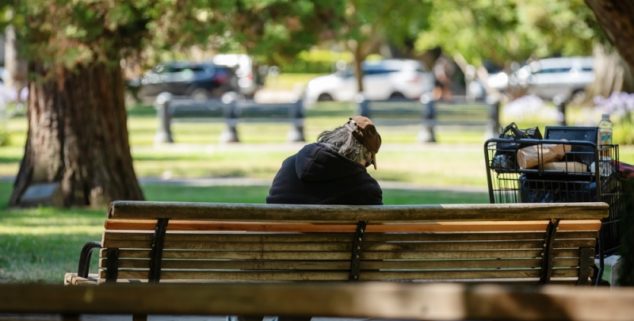News
Sacramento’s homeless measure a statewide template?
 A homeless man sits on a bench just steps from the state Capitol in Sacramento. (Photo: christianthiel.net, via Shutterstock)
A homeless man sits on a bench just steps from the state Capitol in Sacramento. (Photo: christianthiel.net, via Shutterstock)Three days after a deadly mass shooting downtown, the Sacramento City Council voted 7-2 to place a homeless measure on the November ballot. If voters approve the Emergency Homeless Shelter and Enforcement Act of 2022, could it be a statewide template?
We turn to Daniel Conway. He helms the Sacramentans for Safe and Clean Streets and Parks coalition, and is a policy advisor to the Los Angeles Alliance for Human Rights. The latter brought litigation in federal court two years ago against the city and county of LA “to compel them to address their homeless crisis, systematically, humanely and at scale,” he told Capitol Weekly.
Sacramento Steps Forward, a nonprofit that counts the homeless, estimates there were 11,000 unhoused people in the county of Sacramento over 12 months.
“Sacramento’s homeless ballot initiative is an iteration of the LA lawsuit,” said Conway. “The point is not to punish the unhoused but to hold local leaders and systems accountable.”
The capital city’s ballot measure outlaws encampments in public spaces, “defined as four or more unrelated persons camping together within 50 feet of each other and without permitted running water, and bathroom facilities.” These outdoor spaces are “the de facto containment centers for the unhoused,” Conway added.
Sacramento Steps Forward, a nonprofit that counts the homeless, estimates there were 11,000 unhoused people in the county of Sacramento over 12 months. There were 161,000 unhoused people in the Golden State in 2020, according to federal data.
With voter approval, Sacramento’s homeless measure would require the city to shelter 60% of its unhoused residents. That requirement would begin 60 days after the ballot measure passes.
Minutes after the City Council green lit the Emergency Homeless Shelter and Enforcement Act, “we got calls from around the state,” Conway said, “supporting such intervention. I think that 2024 could see a number of jurisdictions doing what Sacramento is to address the homeless crisis.”
“The current proposal fails to mention creation of affordable housing (income-based housing), homeless prevention, taking a trauma informed approach to outreach to encampments…” — Faye Wilson Kennedy
Faye Wilson Kennedy is with the Sacramento Poor People’s Campaign. “The SPPC is opposed to this proposal as drafted,” she told Capitol Weekly. “The current proposal continues the failed public policy of criminalizing unhoused community members, which makes it difficult for people experiencing homelessness to find housing, employment and live dignified lives.
“Additionally, the current proposal fails to mention creation of affordable housing (income-based housing), homeless prevention, taking a trauma informed approach to outreach to encampments, or how the county will be engaged to meet their obligation of providing services to the encampments.”
According to Conway, plans are underway for a Sacramento County ballot measure similar to the Emergency Homeless Shelter and Enforcement Act of 2022, which a leading business group backs publicly.
“The county must provide the mental and health services needed by the men, women and children who are homeless.” — Amanda Blackwood
“Sacramento’s business owners support this proposed measure and stand ready to do our part to move forward with an effort that is in the best interest of all parties,” said Amanda Blackwood, president and CEO of the Sacramento Metro Chamber of Commerce, in a prepared statement. “That said, the Metro Chamber stresses the importance to both city and county leaders that the region’s business community needs to know that their employees and patrons are safe and that the laws will be enforced.
“The county must provide the mental and health services needed by the men, women and children who are homeless. The city and county must provide the shelter. And as taxpayers, we have an expectation that these two pillars – services and shelter – are non-negotiables.”
Meanwhile at the state Capitol, Democratic Assemblymembers Ken Cooley (Rancho Cordova), Kevin McCarty (Sacramento) and Jim Cooper (Elk Grove) have introduced Assembly Bill 2633 “to address public safety on the American River Parkway after the brutal slaying of 20-year-old Emma Roark.”
In addition, the Democratic trio are “proposing $50 million in grant funding to go to counties and regional park districts to support efforts to protect the parkway. Goals of the grant program include 1) preventing fires by reducing the incidents of illegal campfires in regional parks, 2) reducing homelessness by providing services and housing options, and 3) protecting park visitors, wildlife and our natural resources.”
Call Wilson Kennedy a skeptic of this state bill. “AB 2633 would continue to criminalize and punish the unhoused for being unhoused and poor,” according to her. “Our unhoused community members need real housing (not tents in temporary encampments) now! The $50 million figure, spread over the counties that apply for the three purposes above does not leave very much money for “housing options”- which we hope does not mean tents.
“To put the $50 million in perspective—most people think there are about 2,000 homeless people along the American River Parkway. The average monthly rent for a studio apartment is $1,900 in Sacramento.
So multiply 2,000 at $1,900 for 12 months. That equals $45.6 million. Thus, $50 million statewide is clearly not to scale, with the end result being we criminalize our unhoused neighbors since there is not funding to house people—let alone the housing being available.”
—
Editor’s Note: Seth Sandronsky reports regularly for Capitol Weekly. Contact him at [email protected].
Want to see more stories like this? Sign up for The Roundup, the free daily newsletter about California politics from the editors of Capitol Weekly. Stay up to date on the news you need to know.
Sign up below, then look for a confirmation email in your inbox.

Leave a Reply